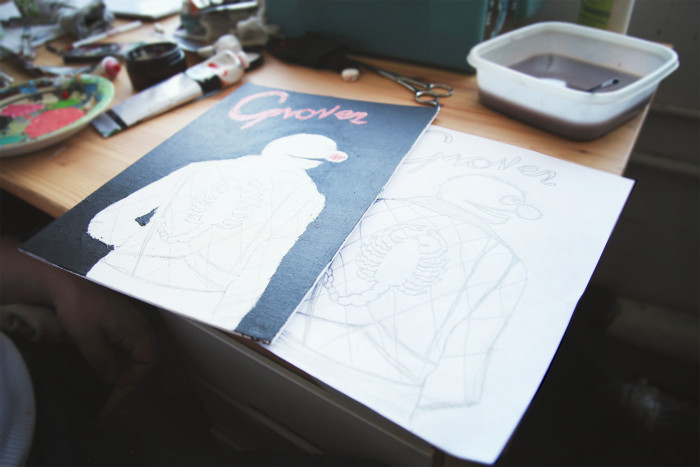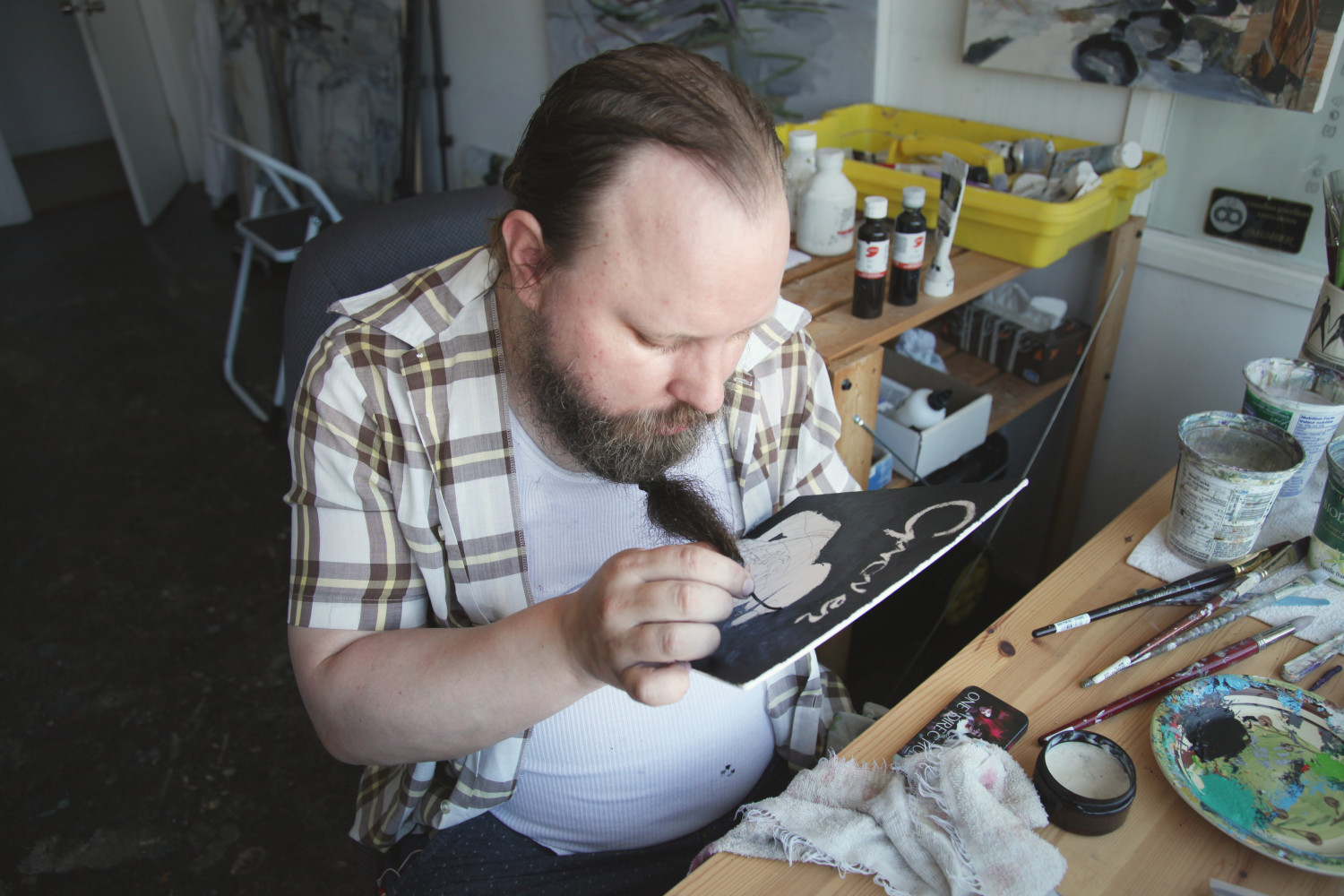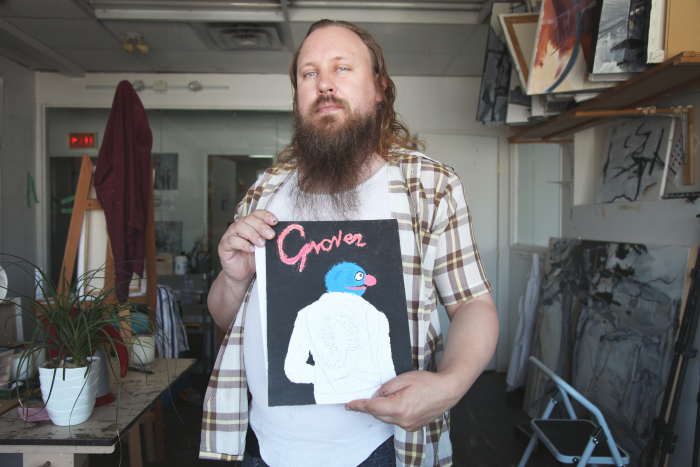Comedian Raises Money for Charity With ‘Beard Paintings’
July 08, 2015
7 min read
For his latest creative project, stand-up comedian Graham Clark has swapped the stage for a paint-splattered desk. Hunched over his work station, he’s busy putting layers of black on the canvas in front of him.
In the middle of the growing sea of black, stands a creature combined of two icons on polar opposite sides of pop culture: Sesame Street’s Grover and Ryan Gosling. “Grover Gosling” is wearing a jacket with a scorpion stitched on the back — the signature outfit from the movie “Drive”.

Inspiration for this and other paintings comes from many sources and usually ideas just “pop into his head”, Graham says. There’s one common thread, though: his artwork is always funny, light-hearted and displays a sense of humour.
There would be nothing worse than somebody who painted with his beard and was super serious about it. That would be a real drag for everybody, like, you know, ‘Get a grip already!’”
Which brings us to the other unusual part of his art: Graham paints with his beard.

It all started with some friends making fun of how big his beard had gotten, Graham says, and that he might as well use it as a paint brush. And he gladly accepted the challenge!
After some trial and error, he came up with a technique that allows him to draw fine lines while still leaving room for surprises.
“I really like the process,” Graham says. “It’s very relaxing, and because the brush is so imprecise I never know how it’s going to turn out. It’s kinda neat that it always has these imperfections.”
Graham sold his first painting on eBay, but instead of keeping the money, he decided he’d rather give it away. A friend of his, who had exhausted various cancer treatments covered by public health care, told him she wanted to try an alternative, albeit expensive, treatment offered in Mexico. Graham produced a series of paintings, sold them for $5,000, and gave the proceeds to her.
“I feel really lucky that I have the time to do something like this. It’s the least I can do.”
After that, he “just kept going“, always giving away one hundred percent of the money he makes. He sometimes picks causes at random, but just as often he gives to causes he’s closely connected to: events affecting his community or a friend in need of help.
In 2013, he sold a series of paintings of famous Calgarians to raise money for victims of the devastating flood that ravaged his home province Alberta. Another series raised money for a new wheelchair for fellow comic Ryan Lachance.
Proceeds of his latest painting — soon to be sold on eBay — will go to the Vancouver Women’s Shelter.

[tw-divider]A Conversation With Graham Clark[/tw-divider]
Throughout his painting session at Beaumont Studios, Graham shared his thought on what motivates him to give back, and why charity is (technically) for everyone, while (de facto) not everyone feels that way.
[tw-column width=”one-third”]
I imagine that making a living as a comedian in an expensive city like Vancouver isn’t exactly a cakewalk. Yet, you’ve decided to give the money you make off your paintings away. Why is that?
[/tw-column]
[tw-column width=”two-third” position=”last”]
It’s been my experience that once you’ve started doing something for money, it really does have the ability to take the joy out of it, because you start asking yourself, ‘What should I be doing?’ I already do a lot of different things to pay the bills and I wanted to keep something that was just for me, something I’d really enjoy doing.
[/tw-column]
[tw-column width=”one-third”]
Gen-Xers and millennials are often portrayed as “charity-fatigued”. Why do you think that is?
[/tw-column]
[tw-column width=”two-third” position=”last”]
I think that the idea of giving back has been…. not hijacked, but it has been given over to the very wealthy. I mean, we just go bananas when a famous person does something that is well within their means to do — when Bill Gates or Warren Buffett give $100 million away, for example. But you rarely hear the stories of little people who made a big difference in their community. So, I think it makes regular people feel like ‘oh, philanthropy is a thing that the very wealthy do’, and that’s too bad, because I don’t think that’s true.
[/tw-column]
[tw-column width=”one-third”]
What do you think is true?
[/tw-column]
[tw-column width=”two-third” position=”last”]
I think that giving back is something everybody can do if they want to. You just have to do it. And it doesn’t have to be money necessarily. It can be something as little as having an elderly neighbour and they can’t mow their lawn, so you do it for them. Those things are within our grasp. And they are not as celebrated, of course, as some celebrity visiting kids at the hospital, but it’s still super important.
To me, it’s just part of what it means to be a person.
[/tw-column]
[tw-column width=”one-third”]
When you say ‘it’s part of being a person’, do you mean we have some sort of civic duty to look out for each other, or that helping each other is just something that’s biologically ingrained in us?
[/tw-column]
[tw-column width=”two-third” position=”last”]
I think in general, giving back is a really natural part of life and people are driven to it. Some people might argue that being greedy is more natural, but I think humans are very tribe-minded. There is this kind of a modern day philosophy that it’s everyone for themselves and ‘dog eat dog’, but that’s not the whole picture and people are pretty tired of that world, I think.
I could be way wrong, but it feels like in the last six or seven years with the recession happening, people are starting to question whether or not our society should function as an outgrowth of one kind of ideology, and they start to think that maybe it should be a blend of a couple of different ones.
[/tw-column]
[tw-column width=”one-third”]
In that sense, do you think that giving back creates community, that it brings us closer together?
[/tw-column]
[tw-column width=”two-third” position=”last”]
Yes, I do think it creates community. You are creating investment in people and ideas. I mean, it’s terrible that it’s usually around something awful, but it’s like the flood in Calgary. I was there at the time and witnessed the community come together and helping each other out. That was really inspiring. Everybody dropped what they were doing. My brothers and my dad spent all their free time to dig people’s houses out, people they didn’t even know.
And that sort of collaboration also happens outside of disaster relief. I regularly do charity shows and I never had any trouble booking people or people saying ‘I don’t have time for that’.
[/tw-column]
[tw-column width=”one-third”]
Speaking of the comedy community in Vancouver: Do you think charity has a place in the arts?
[/tw-column]
[tw-column width=”two-third” position=”last”]I think people in the arts give back disproportionately to what they’re making. They give back an awful lot.
Any given weekend I know a comedian doing a charity show for no pay, and I bet you it’s the same in the music industry and visual arts. Artists put on fundraisers all the time, whether it’s art-specific, or for a specific charity, or a friend who had all their equipment stolen or is sick. There’s room for that and it’s just part of working in the arts.
Anybody in the arts knows what it’s like to have no money and to be on hard times. And you also just get used to the idea of raising money for things, because a lot of artists have to do that all the time for their projects, so it’s no big thing.
Follow Graham Clark
More beard paintings
Graham’s website
Twitter: @grahamclark
[/tw-column]
